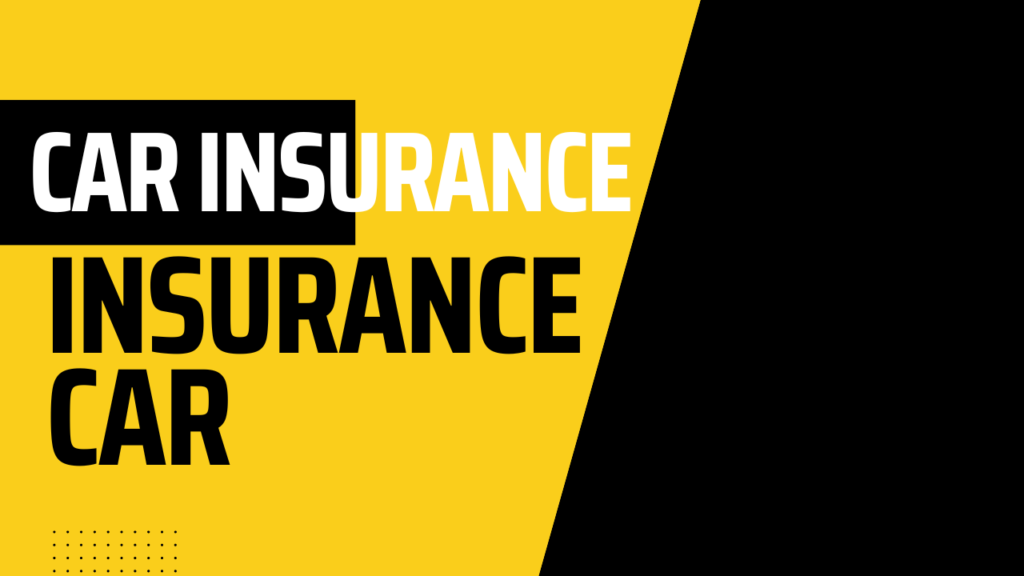Exploring Car Insurance with Zero Deposit: Benefits, Considerations, and Alternatives
Introduction:
Car insurance is a necessity for vehicle owners in the United States, providing financial protection in the event of accidents, theft, or other unforeseen circumstances. In recent years, the concept of car insurance with zero deposit has gained popularity, offering an alternative payment structure for policyholders. This article aims to delve into the topic of car insurance with zero deposit in the American context, highlighting its benefits, considerations, and exploring alternative options.
- Understanding Car Insurance with Zero Deposit:
Car insurance with zero deposit, also known as no deposit car insurance, is an alternative payment structure that has gained popularity in the United States. In traditional car insurance policies, policyholders are typically required to make an upfront deposit, often a lump sum payment, when purchasing insurance coverage. However, zero deposit car insurance eliminates the need for an initial deposit, allowing policyholders to spread out the premium payments over a specific period, usually through monthly installments.
This payment structure provides several advantages for policyholders. One of the primary benefits is improved affordability. For individuals on tight budgets, the absence of an upfront deposit can alleviate the financial burden of a significant payment. It allows them to obtain the necessary car insurance coverage without the immediate strain on their finances.
Additionally, zero deposit car insurance offers enhanced cash flow management. Many Americans manage their monthly expenses meticulously, and car insurance is a recurring cost that needs to be factored in. By distributing the premium payments over several months, policyholders can better align their insurance costs with other financial obligations, making it easier to manage their monthly budget.
Moreover, zero deposit car insurance enhances accessibility and flexibility. For individuals who may struggle with upfront payments, such as those with lower incomes or limited financial resources, this payment structure provides a more accessible option. It opens up car insurance coverage to a broader segment of the population, allowing them to protect their vehicles without the barrier of a significant upfront deposit.
Another advantage is the potential for increased coverage. With zero deposit car insurance, policyholders have the opportunity to obtain broader coverage without having to pay a substantial upfront cost. This can be particularly beneficial for individuals who require more extensive protection, such as those living in areas with higher accident rates or those who own expensive vehicles.
However, policyholders considering zero deposit car insurance should carefully consider certain factors. Long-term cost evaluation is essential. While the absence of an upfront deposit may seem appealing, it is crucial to assess the overall cost of the policy. Some insurance providers may charge higher interest rates or include additional fees when offering zero deposit options, which can increase the overall expense in the long run.
Furthermore, it is vital to evaluate the financial stability and reputation of the insurer. Ensuring that the insurance provider is financially secure is crucial to avoid potential issues with claim handling or policy validity. Policyholders should research the insurer’s financial strength and customer reviews to make an informed decision.
Additionally, policyholders should consider the impact of zero deposit car insurance on their no-claims bonus. A no-claims bonus rewards policyholders for not making claims by providing discounts on future premiums. However, the accumulation and preservation of this bonus may vary with zero deposit policies, and policyholders should understand how it can affect their potential cost savings.
Lastly, policyholders should carefully review the policy to understand any limitations or exclusions. Zero deposit car insurance policies may have specific coverage limitations or circumstances that are not covered. It is crucial to be aware of these limitations to ensure that the policy meets the policyholder’s needs and expectations.
In conclusion, car insurance with zero deposit offers benefits such as improved affordability, enhanced cash flow management, and increased accessibility in the American context. However, policyholders should consider the long-term costs, evaluate the financial stability of the insurer, and understand any limitations or exclusions that may exist within zero deposit car insurance policies. By conducting thorough research and exploring alternative options, policyholders can choose the most suitable car insurance coverage for their needs and financial circumstances.
- Benefits of Car Insurance with Zero Deposit:
Car insurance with zero deposit, also known as no deposit car insurance, offers several benefits to policyholders in the American context. These advantages make it an attractive option for individuals seeking affordable and flexible car insurance coverage.
One of the key benefits of car insurance with zero deposit is improved affordability. Many people may find it challenging to come up with a large upfront deposit when purchasing car insurance. By eliminating the need for an initial deposit, zero deposit car insurance makes coverage more accessible to individuals on tight budgets. It allows them to obtain the necessary insurance without having to make a significant upfront payment, easing the financial burden.
Additionally, zero deposit car insurance provides enhanced cash flow management. In the United States, managing monthly expenses is crucial for many households. By spreading out the premium payments over a specific period, typically through monthly installments, policyholders can better align their car insurance costs with their other financial obligations. This helps in managing their monthly budget more effectively, as they can anticipate and plan for the insurance premium as part of their regular expenses.
Another advantage is the increased accessibility and flexibility it offers. Zero deposit car insurance provides an option for individuals who may struggle with upfront payments due to various reasons, such as lower incomes or limited savings. This payment structure opens up car insurance coverage to a broader segment of the population, ensuring that more people can protect their vehicles without the barrier of a significant upfront deposit. It provides a more inclusive and flexible option for those seeking insurance coverage.
Furthermore, car insurance with zero deposit presents the potential for increased coverage. By eliminating the need for a large upfront deposit, policyholders have the opportunity to allocate their financial resources towards obtaining broader coverage. This is especially beneficial for individuals who require more extensive protection, such as those living in areas with higher accident rates or those who own valuable vehicles. With zero deposit car insurance, they can secure the coverage they need without a substantial upfront cost.
It is important for policyholders to consider their specific financial situation and needs when opting for zero deposit car insurance. While the benefits are significant, it is crucial to evaluate the long-term costs associated with this payment structure. Some insurance providers may charge higher interest rates or include additional fees, which can increase the overall expense over time. Policyholders should carefully review the terms and conditions of the policy and compare different insurance providers to ensure they are getting the best value for their coverage.
In conclusion, car insurance with zero deposit offers benefits such as improved affordability, enhanced cash flow management, increased accessibility, and the potential for increased coverage. These advantages make it an appealing option for individuals seeking car insurance coverage in the American context. However, policyholders should be mindful of the long-term costs and compare different insurance providers to make an informed decision that aligns with their financial circumstances and coverage needs.
III. Considerations for Car Insurance with Zero Deposit:
When considering car insurance with zero deposit, policyholders should take certain factors into consideration to make an informed decision. While this payment structure offers benefits, it is important to evaluate the following aspects in the American context.
One crucial consideration is the long-term cost evaluation. While the absence of an upfront deposit may seem appealing, policyholders should assess the overall cost of the policy. Some insurance providers offering zero deposit options may charge higher interest rates or include additional fees. These factors can increase the overall expense of the policy over time. Policyholders should carefully review the terms and conditions, including the interest rates and any potential hidden fees, to ensure they are aware of the long-term financial implications.
Another consideration is the financial stability of the insurer. It is essential to choose an insurance provider that is financially stable and reputable. Assessing the insurer’s financial strength and customer reviews can provide insights into their ability to handle claims efficiently and maintain policy validity. Policyholders should prioritize selecting an insurer with a strong track record to ensure that their coverage remains reliable.
The impact on the no-claims bonus is another important consideration. A no-claims bonus rewards policyholders for not making claims by providing discounts on future premiums. However, zero deposit car insurance policies may have varying impacts on the accumulation and preservation of this bonus. Policyholders should understand how the zero deposit policy they are considering affects their no-claims bonus and whether it aligns with their goals of maintaining a clean driving record and enjoying potential cost-saving benefits.
Additionally, policyholders should carefully review the policy to understand any limitations or exclusions that may exist. Zero deposit car insurance policies may have specific coverage limitations or circumstances that are not covered. It is essential to thoroughly read and comprehend the policy documents to ensure that the coverage meets their specific needs and expectations.
Comparing alternative options is also worth considering. While zero deposit car insurance can be advantageous, policyholders may want to explore other payment structures as well. Traditional lump sum payment options require an upfront deposit but may offer certain benefits such as potential discounts. Exploring other payment structures like annual, semi-annual, or quarterly installments can help policyholders find the most suitable option based on their financial situation and preferences.
In conclusion, when considering car insurance with zero deposit, policyholders should carefully evaluate the long-term costs, assess the financial stability of the insurer, understand the impact on their no-claims bonus, review policy limitations and exclusions, and compare alternative payment structures. By considering these factors in the American context, policyholders can make an informed decision that aligns with their financial circumstances and coverage needs.
- Alternative Options for Car Insurance:
While car insurance with zero deposit offers benefits and flexibility, policyholders should also consider alternative options to make the best decision for their insurance needs in the American context. Here are some alternative options to consider:
One alternative option is the traditional lump sum payment. With this payment structure, policyholders make an upfront deposit, often in the form of a single lump sum payment for the entire coverage period. While this requires a larger initial payment, it may offer certain advantages such as potential discounts and the convenience of not having to worry about monthly installments. This option is suitable for individuals who can afford to make a larger upfront payment and prefer to avoid monthly payment obligations.
Comparing different payment structures is another alternative. Instead of zero deposit or lump sum payment, policyholders can explore different payment frequencies such as annual, semi-annual, or quarterly installments. Each option has its own advantages and disadvantages. Annual payments may provide potential discounts and reduce administrative hassle, while quarterly or semi-annual payments can help with budgeting by spreading the premium over shorter periods. Policyholders should consider their financial situation and preferences to determine the most suitable payment structure.
Usage-based insurance is an emerging alternative option. This type of insurance calculates premiums based on the actual usage patterns of the insured vehicle. Policyholders can install telematics devices or use smartphone apps to track factors such as mileage, driving behavior, and time of day. This allows insurance companies to assess the risk more accurately and offer personalized premiums. Usage-based insurance is ideal for low-mileage drivers or those with safe driving habits, as it can potentially result in lower premiums compared to traditional fixed-rate policies.
Policyholders can also explore other cost-saving measures. Increasing deductibles is one option to consider. A higher deductible means policyholders would pay more out of pocket in the event of a claim, but it can lead to lower premiums. However, it is important to choose a deductible that is manageable and within one’s financial capabilities. Bundling policies, such as combining car and home insurance with the same provider, can also lead to potential discounts. Additionally, improving driving habits and maintaining a clean record can result in lower premiums through safe driver discounts or rewards programs.
In conclusion, when considering car insurance options in the American context, policyholders should explore alternative options alongside zero deposit insurance. Traditional lump sum payment, comparing different payment structures, usage-based insurance, and other cost-saving measures provide flexibility and potential cost advantages. Policyholders should assess their individual needs, financial situation, and preferences to make an informed decision about the most suitable car insurance option for them.
Conclusion:
Car insurance with zero deposit offers benefits such as improved affordability, enhanced cash flow management, and increased accessibility for individuals in the American context. However, it is crucial to carefully evaluate the long-term costs, consider the financial stability of the insurer, and understand any limitations or exclusions that may exist within zero deposit car insurance policies. Exploring alternative payment structures like lump sum payments or usage-based insurance can also provide viable options for individuals seeking the most suitable car insurance coverage for their needs and financial circumstances in the United States.
Car Insurance with Zero Deposit, Car Insurance with Zero Deposit, Car Insurance with Zero Deposit, Car Insurance with Zero Deposit, Car Insurance with Zero Deposit, Car Insurance with Zero Deposit, Car Insurance with Zero Deposit, Car Insurance with Zero Deposit, Car Insurance with Zero Deposit,
Car Insurance with Zero Deposit, Car Insurance with Zero Deposit, Car Insurance with Zero Deposit, Car Insurance with Zero Deposit, Car Insurance with Zero Deposit, Car Insurance with Zero Deposit, Car Insurance with Zero Deposit, Car Insurance with Zero Deposit, Car Insurance with Zero Deposit,
Car Insurance with Zero Deposit, Car Insurance with Zero Deposit, Car Insurance with Zero Deposit, Car Insurance with Zero Deposit, Car Insurance with Zero Deposit, Car Insurance with Zero Deposit, Car Insurance with Zero Deposit, Car Insurance with Zero Deposit, Car Insurance with Zero Deposit,



